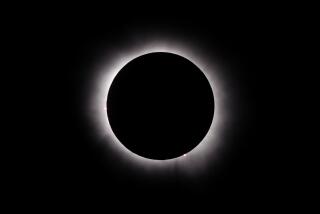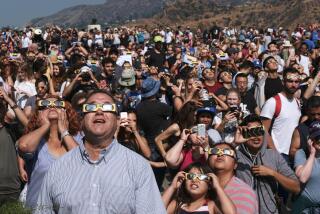China eagerly prepares for a rare total solar eclipse
- Share via
BEIJING — In a popular Chinese legend, a giant named Kua Fu chased the fiery sun across the sky, hoping to end a catastrophic drought. Though the hero dies in impassioned pursuit, the gods take notice of his effort and punish the sun, forcing it farther from Earth and drawing the calamitous weather to a close.
Chinese media were ablaze with the mythical giant’s name today, this time, to refer to amateur astronomers who flocked to southern China for the longest solar eclipse of the 21st century.
The total eclipse was visible along a swath of India and China this morning, at least where it wasn’t obscured by clouds or smog. In China, international and domestic tourists descended on government-designated viewing spots such as Shanghai, nearby Suzhou, and Wuhan, in Hubei province, to witness the phenomenon.
When the eclipse passed over Chengdu, in Sichuan province, passengers on five specially chartered Sichuan Airlines flights chased the moon’s shadow on its trajectory across the country, enveloped in darkness for more than half an hour before landing in Shanghai. The price was $200, and few seats were empty.
For thriftier sun chasers, the total eclipse could be seen from the ground for several minutes. Protective eclipse observation glasses were sold on the streets along the eclipse path, as well as online. On Taobao.com, a Chinese online marketplace, the glasses, at about $1 a pair, nearly sold out.
Authorities adopted nighttime traffic regulations as the skies darkened; construction sites, and even some amusement park rides, were closed in eclipse-affected cities. The official English-language China Daily reported that local authorities were on high alert, assisting traffic and enforcing security.
But neither the security measures nor unfavorable weather conditions in many prime viewing cities did much to hamper the festive atmosphere. Although Shanghai was cloaked in clouds for most of the morning, and even saw some drizzle, the rapid descent into darkness set crowds abuzz.
“It suddenly got dark,” said Michelle Garnaut, the owner of M-on-the-Bund restaurant, “and for about a minute, it was as if it was the middle of the night.”
People were clapping and cheering all along the Bund, Shanghai’s boardwalk.
Garnaut’s restaurant was packed with more than 300 patrons -- mostly foreign, but some local -- who poured in for an eclipse breakfast.
Elsewhere in Shanghai, 20 couples tied the knot as the moon met the sun. The organizer of the weddings, a man surnamed Yu, told the Xinmin Evening News that the celestial phenomenon would be “the perfect witness to the couples’ happiness.”
The 100-member Astronomy Club of Shanghai’s Tongji University took textbooks and telescopes to the streets to view and discuss the event with passersby.
An Internet campaign succeeded in persuading the city of Shanghai to scrap a plan to turn on streetlights during the eclipse, which would have distracted from viewing.
Said Garnaut, the restaurateur, afterward: “We’re all saying, can we do it again next week?”
More to Read
Sign up for Essential California
The most important California stories and recommendations in your inbox every morning.
You may occasionally receive promotional content from the Los Angeles Times.










